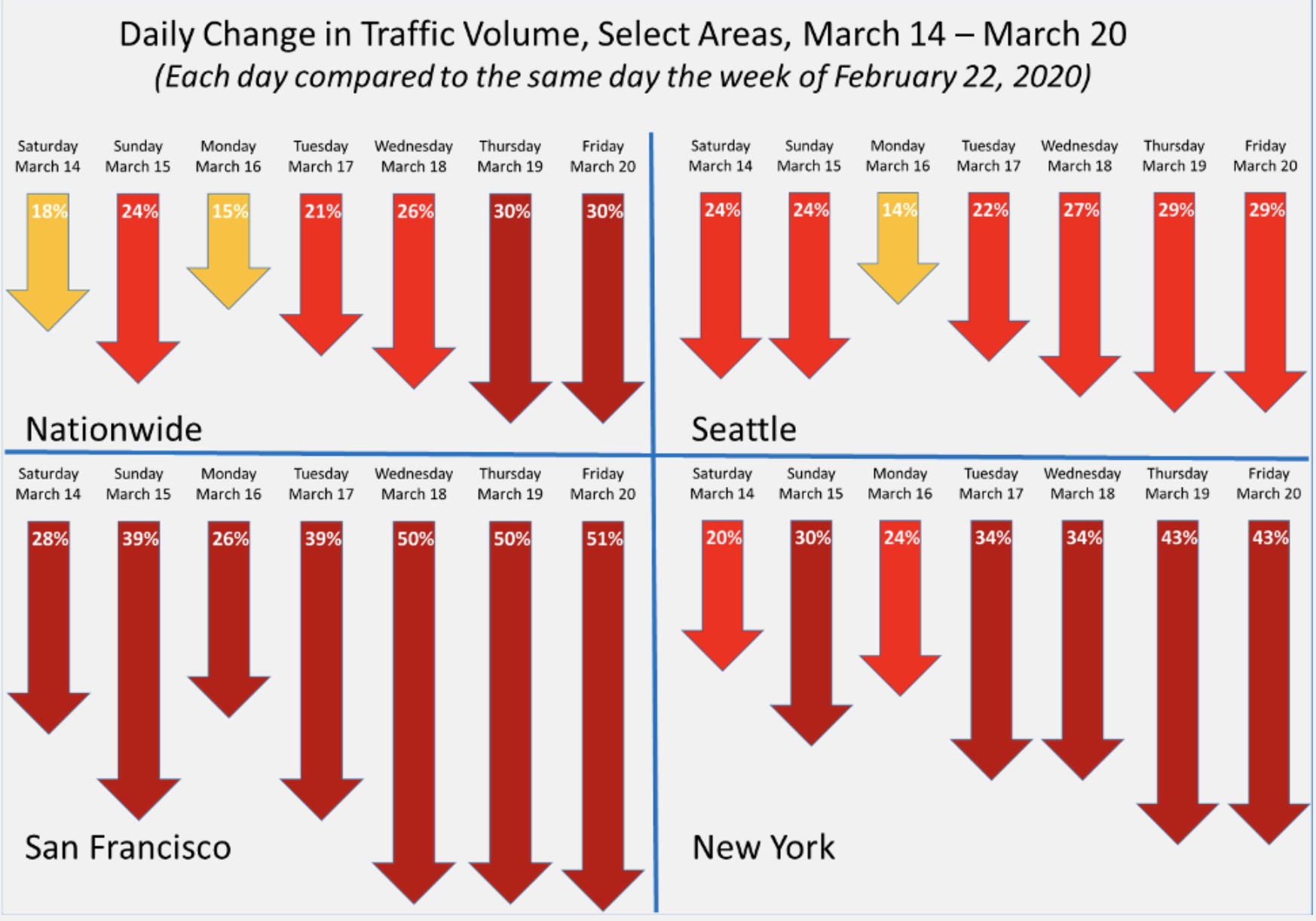Hello of us, welcome abet (or hello for the first time) to The Role, a weekly newsletter dedicated to the the total strategies of us and programs circulate round this world. I’m your host, Kirsten Korosec, senior transportation reporter at TechCrunch.
I also non-public began to put up a shorter model of the newsletter on TechCrunch . That’s what you’re discovering out now. For the total enchilada — which comes out every Saturday — it’s likely you’ll presumably maybe maybe subscribe to the newsletter by heading over right here, and clicking “The Role.” It’s free!
Before I earn into the thick of issues, how is each person doing? This isn’t a rhetorical quiz; I’m being earnest. I prefer to hear from you (display my electronic mail below). Maybe you’re a startup founder, a safety driver at an self sustaining automobile developer, a challenge capitalist, engineer or gig economic system employee. I’m attracted to the manner you are doing, what you’re doing to cope and the manner you’re getting round on your respective cities.
Please attain out and electronic mail me at kirsten.korosec@techcrunch.com to portion tips, opinions or tricks or ship a bid message to @kirstenkorosec.
Micromobbin’
It used to be a tough week for micromobility amid the COVID-19 pandemic. Bird laid off about 30% of its workers because of this of the uncertainty caused by the coronavirus.
In a memo purchased by TechCrunch, Bird CEO Travis VanderZanden acknowledged:
The unparalleled COVID-19 crisis has compelled our management group and the board of directors to damage many extraordinarily sophisticated and painful selections touching on to a couple of your teammates. As , we’ve had to pause many markets around the enviornment and enormously within the reduction of spending. This implies that of the financial and operational impact of the ongoing COVID-19 crisis, we are asserting goodbye to about 30% of our group.
The fallout from COVID-19 isn’t little to Bird. Lime could be reportedly inquisitive about shedding up to 70 of us within the San Francisco Bay Space.
Meanwhile, Wheels deployed e-bikes with self-cleansing handlebars and brake levers to relief within the reduction of the probability of spreading the virus. NanoSeptic’s abilities, which is powered by light, uses mineral nano-crystals to maintain an oxidation reaction that is stronger than bleach, in accordance to the firm’s web web page. NanoSeptic then implements that abilities into skins and mats to present the relaxation from a mousepad to door handles to handlebars into self-cleansing surfaces.
The upshot to all of this: COVID-19 is popping shared mobility on its head. That manner lay offs will continue. It also manner corporations adore Wheels will try to innovate or pivot in hopes of staying alive.
While some corporations pulled scooters off city streets, others changed how they marketed companies. Some grew to change into efforts to gig economic system workers handing over meals. Others, adore shared electric moped service Revel, are focusing on healthcare workers.
Revel is now letting healthcare workers in Recent York rent its mopeds without cost. To qualify, they factual prefer to upload their employee ID. For now, the free rides for healthcare workers is little to Brooklyn, Queens and a brand new service blueprint from greater Manhattan all the style down to 65th freeway. Revel expanded the blueprint to consist of hospitals in a single in every of the epicenters of the illness.
Revel is easy renting its mopeds to the relaxation of us available, though they abet of us to handiest advise them for notable trips. As you are going to wager, ridership is down very much. The firm says it has stepped up efforts of disinfecting and cleansing the mopeds and helmets. Revel also operates in Austin, Recent York City, Oakland, and Washington. It has suspended service in Miami per native rules.
— Megan Rose Dickey (with a cameo from Kirsten Korosec)
Deal of the week
On the total, I could presumably maybe well highlight a mountainous funding round for a startup within the “deal of the week” part. This week, I non-public broadened my definition.
On Friday, the Residence of Representatives passed a ancient stimulus bundle diagnosed as the Coronavirus Merit, Help, and Financial Security or “CARES” act. President Donald Trump signed it hours later. The CARES act incorporates an unparalleled $2.2 trillion in total financial relief for corporations, public institutions and folk hit laborious by the COVID-19 pandemic.
TechCrunch has factual began what’s going to be a multi-day dive into the 880-page doc. And within the arrival weeks, I’m going to highlight the relaxation connected or relevant to the transportation alternate or startups right here.
I’ll concentrate on the present time on three objects: airlines, public transit and tiny business loans.
U.S. airlines are receiving $58 billion. It breaks all the style down to about $25 billion in loans for industrial carriers, $25 billion in payroll grants to quilt the 750,000 workers who work within the alternate. Cargo carriers will earn $4 billion in loans and $4 billion in grants. These loans strategy with some strings connected. Airways will prefer to agree no longer to lay off workers thru the live of September. The bundle forbids inventory buybacks and issuing dividends to shareholders for a 365 days after paying off one in every of the loans.
Public transit has been distributed $24.9 billion. The CARES Act affords nearly three cases the FY 2020 appropriations for this category, in accordance to the American Public Transportation Affiliation. The funds are distributed thru a formula that locations $13.79 billion to urban, $2 billion to rural, $7.51 billion towards bellow of very most real looking repair and $1.71 billion for high-density bellow transit. APTA notes that these funds are for working charges to prevent, put collectively for, and answer to COVID-19 starting on January 20, 2020.
Amtrak purchased an additional $1 billion in grants, that directs $492 million of these funds towards the northeast hall. The final goes to the national community.
Little business loans are a major a part of the invoice, and an blueprint where many startups could be focused. There’s loads to unpack right here, however in traditional phrases the act affords $350 billion in loans that could be administered by the Little Alternate Administration to corporations with 500 or fewer workers. These loans are supposed to quilt an eligible borrower’s payroll, rent, utilities charges and mortgage interest for up to eight weeks. If the borrower maintains its group, almost definitely the major loan could be forgiven.
Challenge-backed startups looking for relief can also escape into complications qualifying. All of it comes all the style down to how workers are counted. Generally, SBA looks to be to be like at a firm’s affiliates to make a choice within the occasion that they qualify. So, a startup owned by a non-public equity firm is regarded as as affiliated with the assorted corporations in that firm’s portfolio, which could presumably maybe maybe push employment numbers some distance previous 500. That rule also looks to be to practice to challenge-backed startups, whereby more than 50% of balloting inventory is held by the VC.
The guidance on right here is easy spotty. But Fenwick & West, a Silicon Valley regulation firm, acknowledged in fresh explainer that the rule has the “doable to be problematic for startups as a result of SBA affiliation rules are highly complex and can trigger lenders to group collectively quite loads of in some other case unaffiliated portfolio corporations of a single challenge capital firm in figuring out whether or no longer a borrower has no longer more than 500 workers.”
One closing display: The SBA has waived these affiliation rules for borrowers within the meals companies and meals offer chain alternate. It’s unclear what that will presumably maybe maybe mean for these meals automation startups or corporations building self sustaining automobiles for meals offer.
Extra deal$
COVID-19 has taken over, however offers are easy occurring. Here’s a rundown of some of partnerships, acquisitions and fundraising round that purchased our consideration.
- Lilium, the Munich-based mostly completely mostly startup that is designing and building vertical utilize-off and touchdown (VTOL) plane and aspires to escape in its luxuriate in taxi rapid, has raised $240 million in a funding round led by Tencent. Here is being couched as an inside of round with handiest present traders, an inventory that included participation from previous backers similar to Atomico, Freigeist and LGT. The valuation is no longer being disclosed. But sources picture us that it’s between $750 million and $1 billion.
- Wunder Mobility purchased Australia-based mostly completely mostly automobile condo abilities provider KEAZ. (Monetary phrases weren’t disclosed, however as section of the deal KEAZ founder and CTO Tim Bos is becoming a member of Wunder Mobility) KEAZ developed a cell app and abet-live administration instrument that lets condo companies, automobile dealerships, and corporations present shared earn entry to to automobiles.
- Cazoo, a startup that buys outdated automobiles and then sells them on-line and delivers to them your door, raised $116 million funding. The round used to be led by DMG Ventures with Customary Catalyst, CNP (Groupe Frère), Mubadala Capital, Octopus Ventures, Eight Roads Ventures and Hasten.VC also taking fragment.
- Helm.ai came out of stealth with an announcement that it has raised $13 million in a seed round that entails investment from A.Capital Ventures, Amplo, Binnacle Companions, Sound Ventures, Fontinalis Companions and SV Angel. Helm.ai says it developed instrument for self sustaining automobiles that can skip frail steps of simulation, on-avenue attempting out and annotated files region — all instruments which could be outdated to educate and enhance the so-called “mind” of the self-riding automobile.
- RoadSync, a digital fee platform for the transportation alternate, raised a $5.7 million in a Assortment A led by Injurious10 Companions with participation from repeat investor Hyde Park Challenge Companions and Companyon Ventures. The firm developed cloud-based mostly completely mostly instrument that lets corporations invoice and accept payments from truck drivers, carriers and brokers. Their platform is in advise at over 400 locations nationwide with over 50,000 weird and wonderful transactions monthly, in accordance to RoadSync.
- Self-riding truck startup TuSimple is partnering with automobile provider ZF to maintain and assemble self sustaining automobile abilities, similar to sensors, on a industrial scale. The partnership, slated to birth in April, will quilt China, Europe and North The US.
A closing observe
Undergo in tips, the weekly newsletter facets even more mobility news and insights. I’ll sprint away ya’ll with this one chart from Inrix. The firm has launched a U.S. traffic synopsis that it plans to put up every Monday. The chart exhibits traffic from the week of March 14 to March 20. The upshot: COVID-19 decreased traffic by 30% nationwide.






